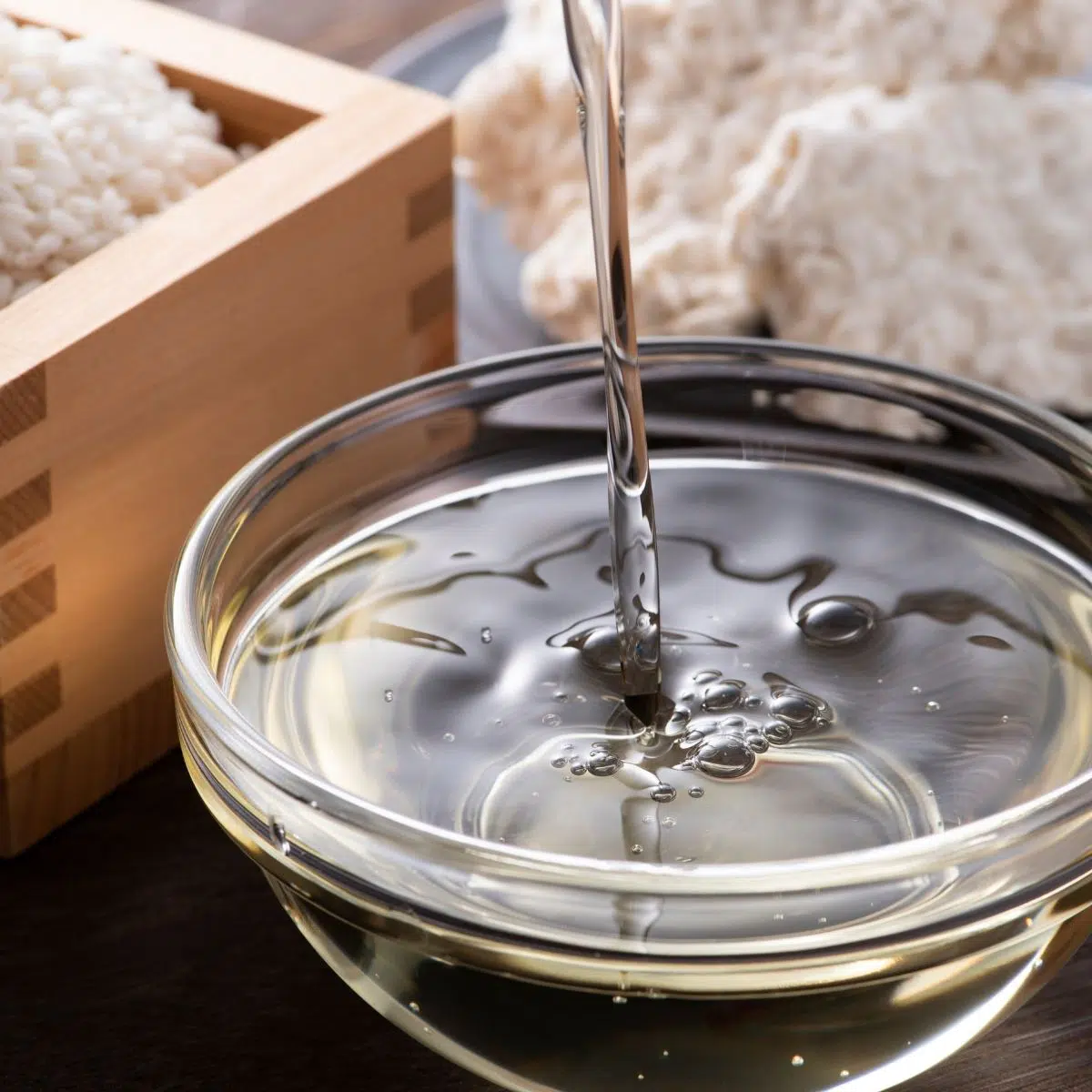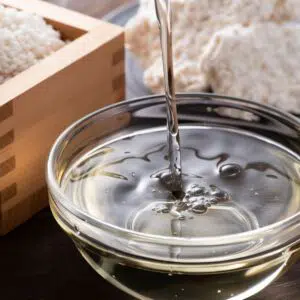If you need a great mirin substitute because you're planning on enjoying some Asian-inspired recipes, look no further! This slightly sweet, acidic rice wine is a key flavor in many dishes, so using the best mirin alternative is key!

The very best mirin substitutes to use in any recipe!
If you are a fan of Japanese cooking, then you may already be familiar with mirin. However, if you are new to this type of cuisine you may find yourself wondering what mirin is.
Moreover, you may be wondering how to substitute for this new ingredient when you don't have any on hand.
Jump to:
- What is Mirin?
- What is Mirin Used For?
- The Best Substitutes for Mirin
- 1. Aji-Mirin
- 2. Sake
- 3. Sake + Honey
- 4. Vermouth
- 5. White Wine
- 6. Dry Sherry
- 7. Marsala Wine
- 8. Rice Wine Vinegar + Sugar
- 9. Chinese Cooking Wine
- 10. DIY Mirin
- 11. Kombucha
- 12. White Grape Juice
- 13. Apple Cider Vinegar
- 14. Balsamic vinegar
- 15. Diluted Agave Syrup
- 16. Water + Honey
- 📖 Recipe Card
- 💬 Comments & Reviews
What is Mirin?
Mirin is a type of rice wine that comes from Japan. Made from fermented rice, it has a similar taste to one of Japan's most popular rice wines - sake.
While it shares the acidity of sake, mirin is slightly sweeter than sake though. In addition, while sake is primarily used for drinking, mirin is mostly used for cooking.
Even though mirin contains alcohol, it has a lower alcohol content than sake. If you are not familiar with cooking with alcohol, not to worry - the alcohol burns off during cooking. Therefore, you are left with the flavor, but not the alcohol.
What is Mirin Used For?
A staple in Japanese cooking, mirin adds an additional hint of umami flavor to many dishes. Its sweet taste also makes it especially great for marinades and glazes.
It is often combined with soy sauce or tamari to make flavor-rich sauces. This combination, along with other seasonings, creates a wonderfully rich, earthy flavor with the perfect amount of sweetness. Teriyaki sauce is an excellent example of this flavor combo.
The Best Substitutes for Mirin
1. Aji-Mirin
If you don't have access to real mirin the next best thing is aji-mirin. While aji-mirin is a form of rice cooking wine, it has some differences from real mirin.
Mirin is made from fermenting rice over long periods of time, but aji-mirin is made with several other ingredients to help mimic the real thing. Aji-mirin is made with water, corn syrup, alcohol, rice, and salt.
If you are looking for mirin in the grocery store you will most likely find aji-mirin. Since it is easier to find and less expensive than real mirin, it is a great substitute to start with.
Use aji-mirin in a 1:1 substitute for mirin. Be mindful that it has a higher salt content than real mirin, so you may want to leave out some of the additional salt in the recipe.
2. Sake
Using drinking wine for cooking is not a new thing. Many delicious sauces and soups are made with wine as a base. So, if you have a bottle of sake in the cabinet go ahead and grab it for your recipe.
Sake is also made from fermented rice. Commonly used as a beverage though, sake has less sugar and more alcohol than mirin.
With the higher alcohol percentage, it will take longer to cook the alcohol out of the sake. Therefore, you will want to add it to the recipe earlier than you would with mirin.
Sake can easily be used in a 1:1 substitution for mirin in any recipe.
3. Sake + Honey
Even though sake has a similar flavor profile to mirin, it is not as sweet. Therefore, if you want to match the flavor more closely you can add your own sweetener.
Honey is a great option, but you can also use plain sugar. This is an especially great choice for recipes that are intended to be on the sweeter side (like teriyaki sauce).
Add ½ teaspoon of honey (or sugar) to 1 tablespoon of sake. Use as a 1:1 exchange for 1 tablespoon of mirin.
4. Vermouth
Next time you want to make a Martini, keep the vermouth out and use it as a substitute for mirin.
If Martini's are your go-to drink, then you already know there are two types of vermouth: sweet and dry. As a substitute for mirin, sweet vermouth is your best option. However, you can also use dry.
Vermouth works well as a substitute in any recipe but works especially well in dressings and marinades.
Even though sweet vermouth has some sweetness, it is not quite as sweet as mirin. Therefore, add a bit of sugar before using it.
Mix ½ teaspoon of sugar with 1 tablespoon of vermouth. Use as a substitute for 1 tablespoon of mirin.
In addition, if you have a recipe that calls for a larger volume of mirin, mix 1 tablespoon of sugar with ¼ cup of vermouth and use in place of a ¼ cup of mirin.
5. White Wine
If wine is more your drink of choice, you still have a great substitute for mirin. Although, this is for white wine drinkers (feel free to pour a glass of your favorite red to enjoy with your dish though).
A dry white wine like a Sauvignon Blanc or Pinot Grigio is your best choice as a substitute. These wines will give you a light flavor with a bit of acidity that resembles mirin. Then you can add a touch of sugar to bring out the sweetness.
The lightness of white wine works particularly well in recipes that call for larger quantities of mirin, such as soups and sauces. It can be used in any recipe though.
Mix 1 tablespoon of sugar with ¼ cup of white wine and use in place of a ¼ cup of mirin. In smaller quantities, use ½ teaspoon of sugar and 1 tablespoon of wine in place of 1 tablespoon of mirin.
6. Dry Sherry
Dry sherry is a popular cooking wine. Its flavor has a wide range depending on what type of sherry you get. Some have a nuttier flavor profile, while others resemble dried fruit.
While the overall flavor may shift slightly depending on the type of sherry you get, none of them will be super sweet. However, they all will provide a nice acidic base.
As with other wines and liquors, you can easily bump up the sweetness with a little bit of sugar.
Add a ½ teaspoon of sugar to 1 tablespoon of dry sherry to equal 1 tablespoon of mirin. Use for sauces, glazes, and marinades.
7. Marsala Wine
Hailing from the boot of Italy, Marsala is a cooking wine from Sicily. With a sweet and sometimes nutty flavor profile it has similar elements to mirin.
Unlike other substitutes, Marsala has a natural sweetness that is well balanced with some acidity. Therefore, it has the two flavor profiles needed to replace mirin without any modifications.
Use dry sherry in a 1:1 ratio for mirin in sauces, glazes, marinades, and other similar recipes.
8. Rice Wine Vinegar + Sugar
While rice wine vinegar is also made from fermented rice, it does not contain any alcohol. Instead, it is the fermentation process ends when the rice reaches a vinegar state.
As a result, rice wine vinegar has a strong acidic taste. The acidity of rice vinegar is a bit stronger than mirin. It is also missing the sweetness of mirin.
As with other substitutes though, you can modify the flavor to resemble mirin with the simple addition of some sugar.
Mix a ½ teaspoon of sugar with 1 tablespoon of rice vinegar to replace 1 tablespoon of mirin.
When using rice wine vinegar be mindful that you do not use one that has been flavored or seasoned, these will not work well as a substitute.
9. Chinese Cooking Wine
Chinese cooking wine is commonly used in Chinese cuisine. It is quite versatile and is used to add flavor to many of the same dishes that mirin is used in.
While Chinese cooking wine has a slightly sweet and nutty flavor, it is still not very sweet. It also has a higher alcohol content than mirin. Therefore, you will need to add some sweetness. You will also want to add it earlier in the recipe to get all the alcohol cooked out.
Mix 1 tablespoon of Chinese cooking wine with a ½ teaspoon sugar to equal 1 tablespoon mirin.
10. DIY Mirin
If you are thinking of buying sake anyway, then you may want to take the time to make your own mirin. It is just a few extra minutes compared to using sake on its own. The flavor will be that much better though.
- 3 tablespoons of water
- ¼ cup sugar
- ¾ cup of sake
Combine the water and sugar in a pot and bring to a boil. Remove from the heat and pour in the sake. Mix well and let cool. Use your homemade mirin in any recipe that calls for it.
11. Kombucha
Your favorite fruit-flavored post-yoga kombucha may not be the best flavor profile for your recipe. However, plain kombucha (or even ginger kombucha) can be a great substitute.
Kombucha has a mild acidity and often a bit of sweetness that can bring a nice flavor to recipes that call for mirin. Even plain kombucha will change the overall flavor slightly though, so be mindful of that when choosing this substitute.
The great thing about kombucha is that it can be used in a simple 1:1 exchange in any recipe.
12. White Grape Juice
Even though the alcohol cooks, some people prefer to use an alcohol-free substitute. White grape juice is one option for this kind of substitute.
While white grape juice offers the sweetness that some other alternatives don't, it is almost too sweet on its own. Therefore, you will want to cut the sweetness with a bit of lemon juice.
Even with the lemon juice, this is still a naturally sweeter substitute. It is best used for recipes that are intended to be on the sweeter side.
Add ½ teaspoon of lemon juice to 1 tablespoon of grape juice to replace 1 tablespoon of mirin. If you feel like it is still too sweet, feel free to add a bit more lemon juice.
13. Apple Cider Vinegar
Apple cider vinegar will change the overall flavor profile of your dish. However, it has a nice balanced acidity that can help add a nice new flavor to your recipe.
The boldness of the vinegar works especially well in sauces that are like barbeque sauce. It can also work in certain desserts or salad dressings.
Use apple cider vinegar in a 2:1 ratio for mirin (2 tablespoons of vinegar for 1 tablespoon of mirin).
14. Balsamic vinegar
Balsamic vinegar has sweetness and acidity like mirin; however, the overall flavor profile is quite different. The texture is also different as balsamic vinegar has a syrup-like consistency.
The syrup-like consistency of balsamic vinegar is a nice addition to many sauces and glazes though. It can also work in many dressings.
Due to the rich flavor of balsamic vinegar, use less than you would of mirin: 2 teaspoons of vinegar for every 1 tablespoon of mirin.
15. Diluted Agave Syrup
Agave syrup is another alternative that has a thick consistency that works well for glazes. It is also a great choice for specialty cocktails.
Since agave does not have any acidity though, be mindful of how sweet it is. Even in sweet recipes, on its own agave is still too sweet. For the best results, dilute it with water prior to using it.
Mix 1 tablespoon of agave with 3 tablespoons of water. Measure the diluted agave in a 1:1 ratio for mirin.
16. Water + Honey
If you find yourself in a real bind and need a flavor enhancement, plain old water with a bit of honey can be used. This will not provide you with the same flavor of mirin. However, it will help enrich the flavor of your dish.
Mix one teaspoon of honey or sugar with one tablespoon of water. Since this does not offer the acidity of mirin, use this in a pinch for recipes that are focused on sweetness.
With so many easy mirin substitutes, you're sure to find one that will fit your recipe perfectly! Leave us a comment below to tell us about what you're cooking!
Do you love a recipe you tried? Please leave a 5-star 🌟rating in the recipe card below and/or a review in the comments section further down the page.
Stay in touch with me through social media @ Pinterest, Facebook, Instagram, or Twitter! Subscribe to the newsletter today (no spam, I promise)! Don't forget to tag me when you try one of my recipes!
📖 Recipe Card
Best Mirin Substitute: My 2 Favorite DIY Homemade Blends (+More Great Ideas!)
Ingredients
Option 1 (A Personal Favorite) - Sake + Honey
- 1 tablespoon sake
- ½ teaspoon honey (or sugar)
Option 2 (More Readily Available) - Rice Wine Vinegar + Honey
- 1 tablespoon rice wine vinegar (unseasoned)
- ½ teaspoon honey (or sugar)
(Note: 2x or 3x only changes the ingredient list)
Instructions
Option 1 (A Personal Favorite) - Sake + Honey
- Combine sake and honey and mix until well blended. Use the same as you would use mirin in any recipe.
Option 2 (More Readily Available) - Rice Wine Vinegar + Honey
- Combine unseasoned rice wine vinegar and honey and mix until well blended. Use the same as you would use mirin in any recipe.



Chris says
Perfect, I was making an Asian recipe and it called for mirin, this will work perfectly!
Sun says
HEB JE OOK WEL EENS ZANDTAART GEGETEN?!!!
MIJN OMA'S RECEPT KUN JE KRIJGEN ALS JE WILT.
LUVVV
SUN
"HAVE YOU EVER EATED SANDCAKE?!!!
YOU CAN GET MY GRANDMA'S RECIPE IF YOU WANT.
LUVVV
SUN"
Angela @ BakeItWithLove.com says
Ik heb nog nooit sandcake geprobeerd, maar ik zou graag het recept van je oma willen proberen! Je kunt het naar mij sturen via angela@bakeitwithlove.com
"I haven't ever tried sandcake, but I would love to try your Grandma's recipe! You can send it to me at angela@bakeitwithlove.com "